Nephrologist Resume Examples

Jul 18, 2024
|
12 min read
Crafting a nephrologist resume: standing out in the kidney of the job market. Learn how to highlight your skills, experience, and education to make your resume shine like a healthy kidney.
Rated by 348 people
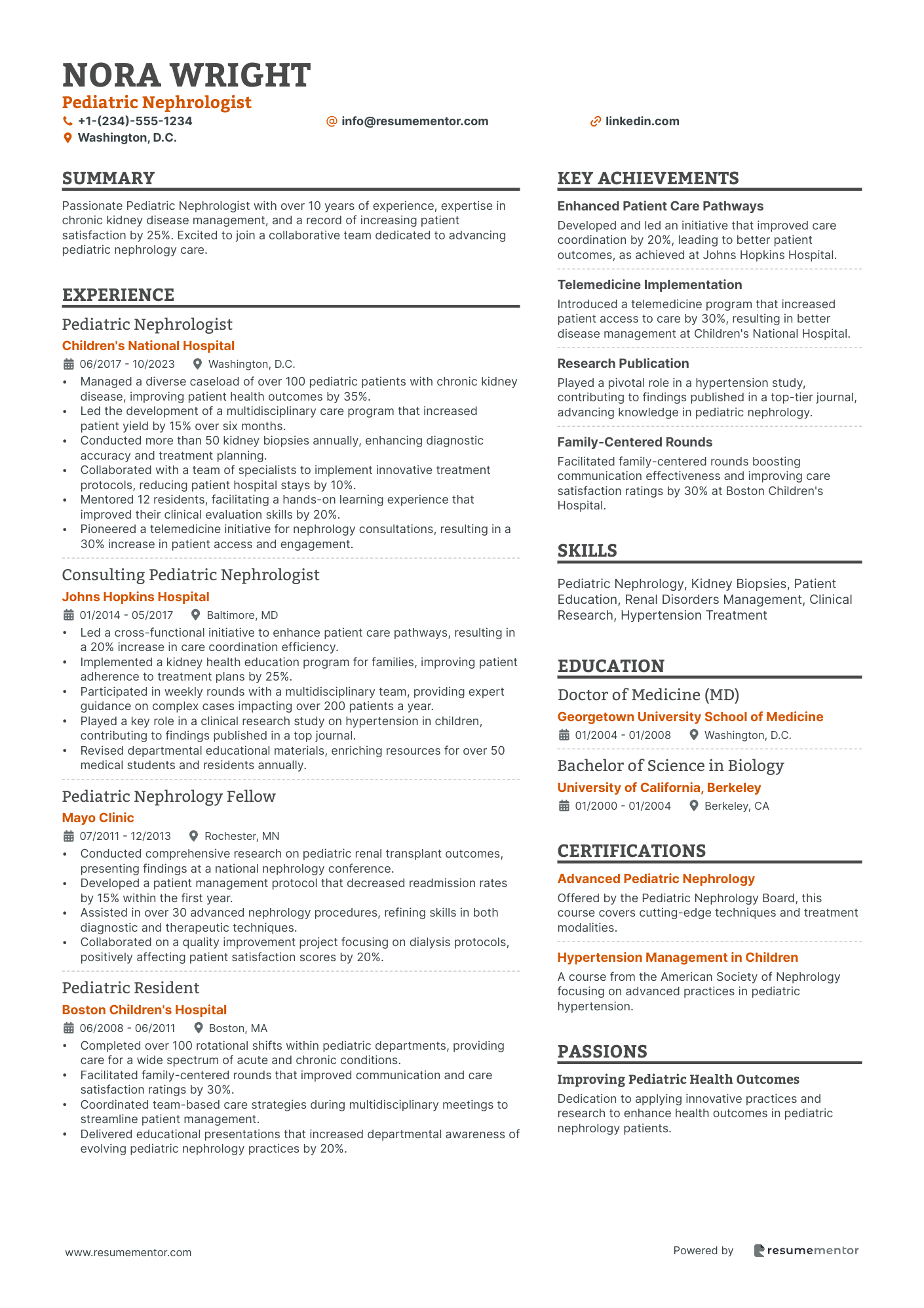
Pediatric Nephrologist
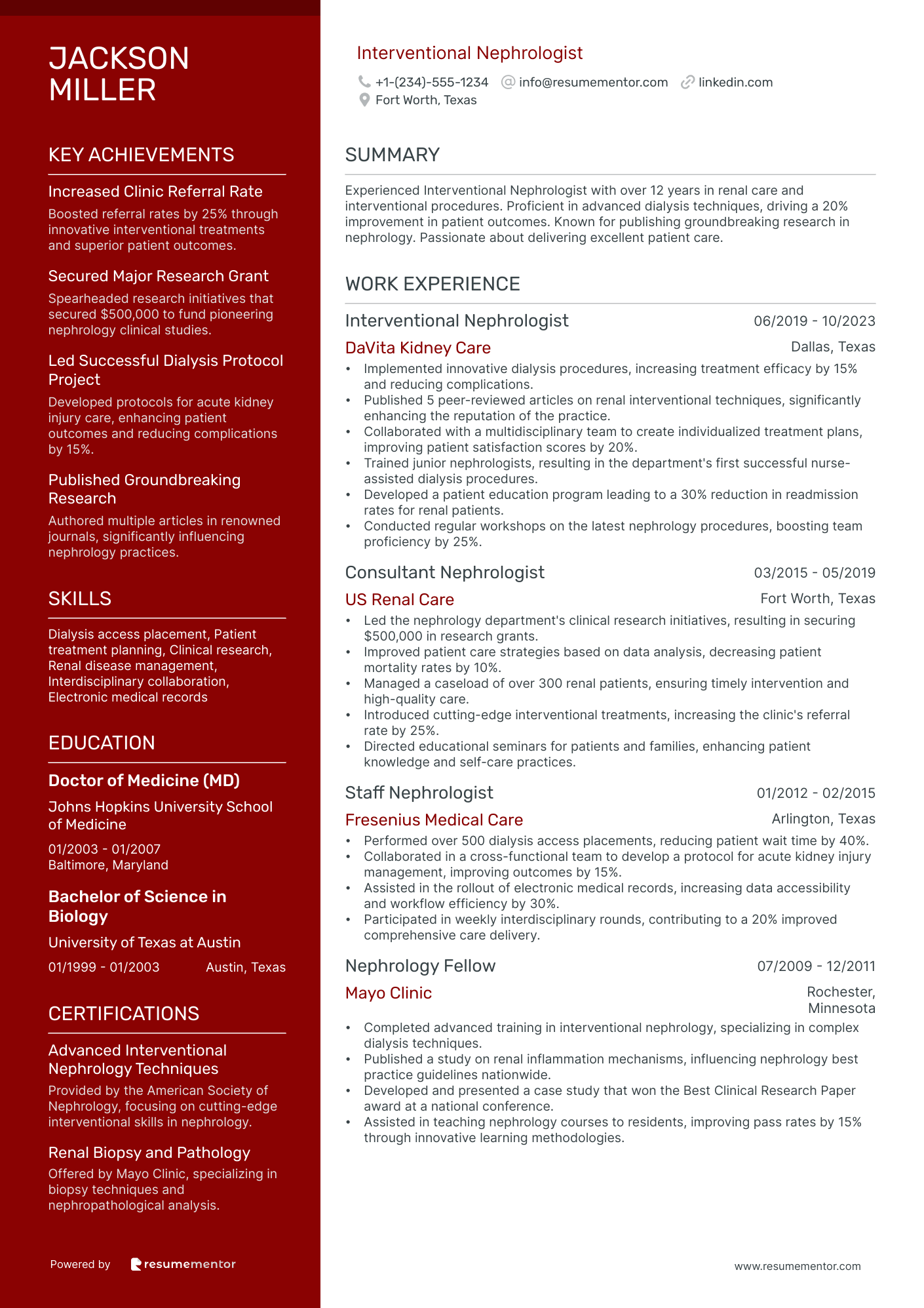
Interventional Nephrologist
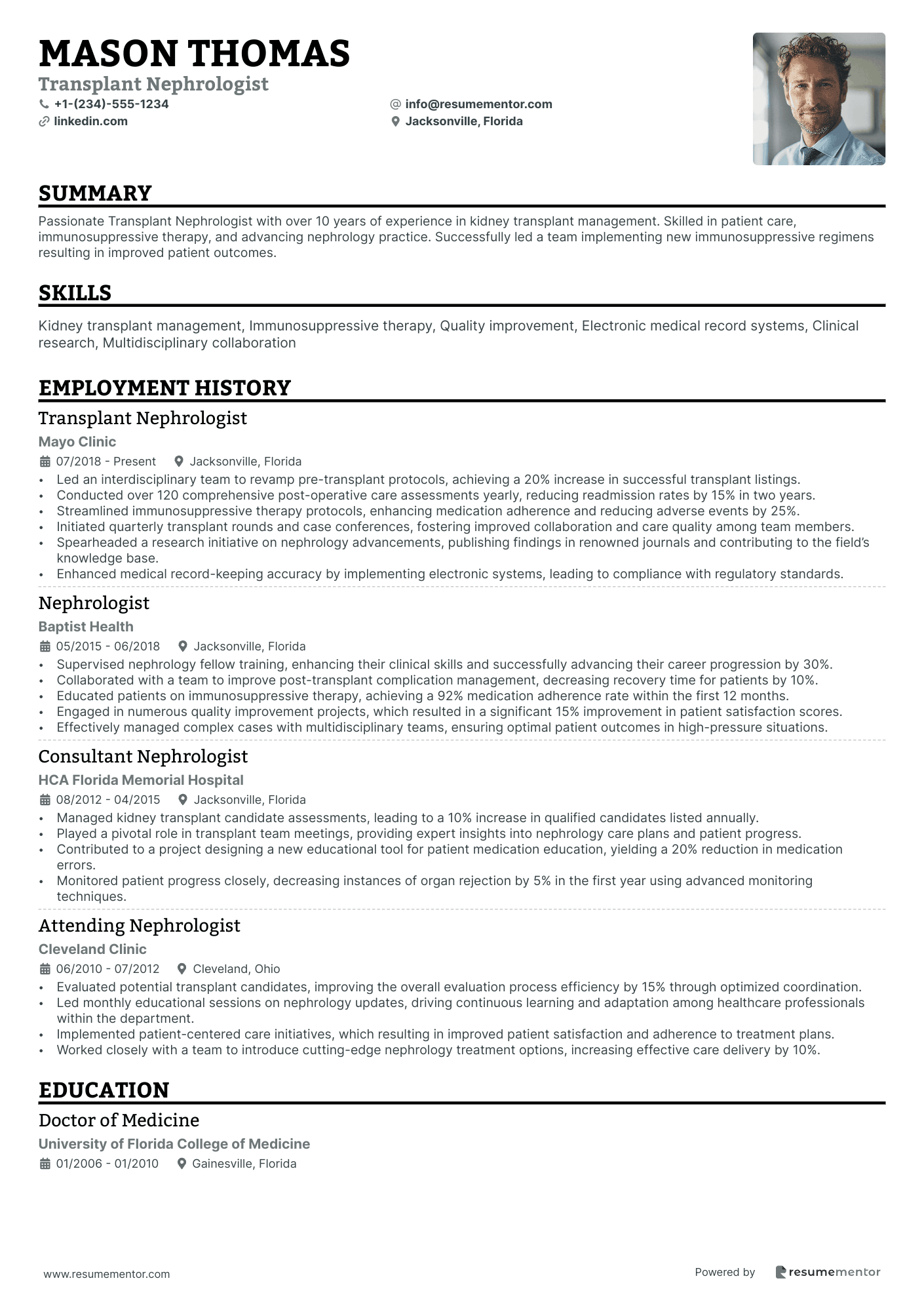
Transplant Nephrologist
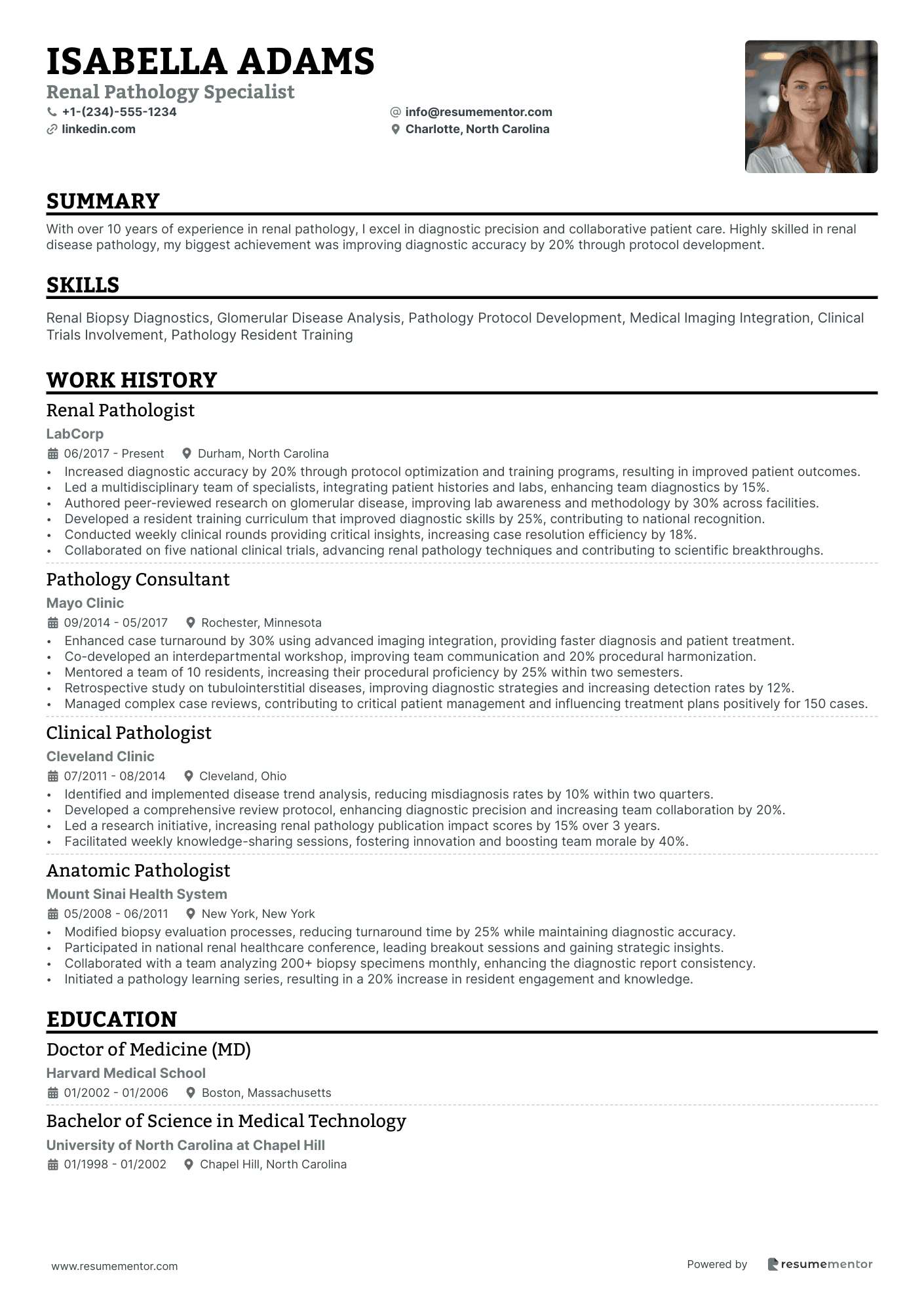
Renal Pathology Specialist
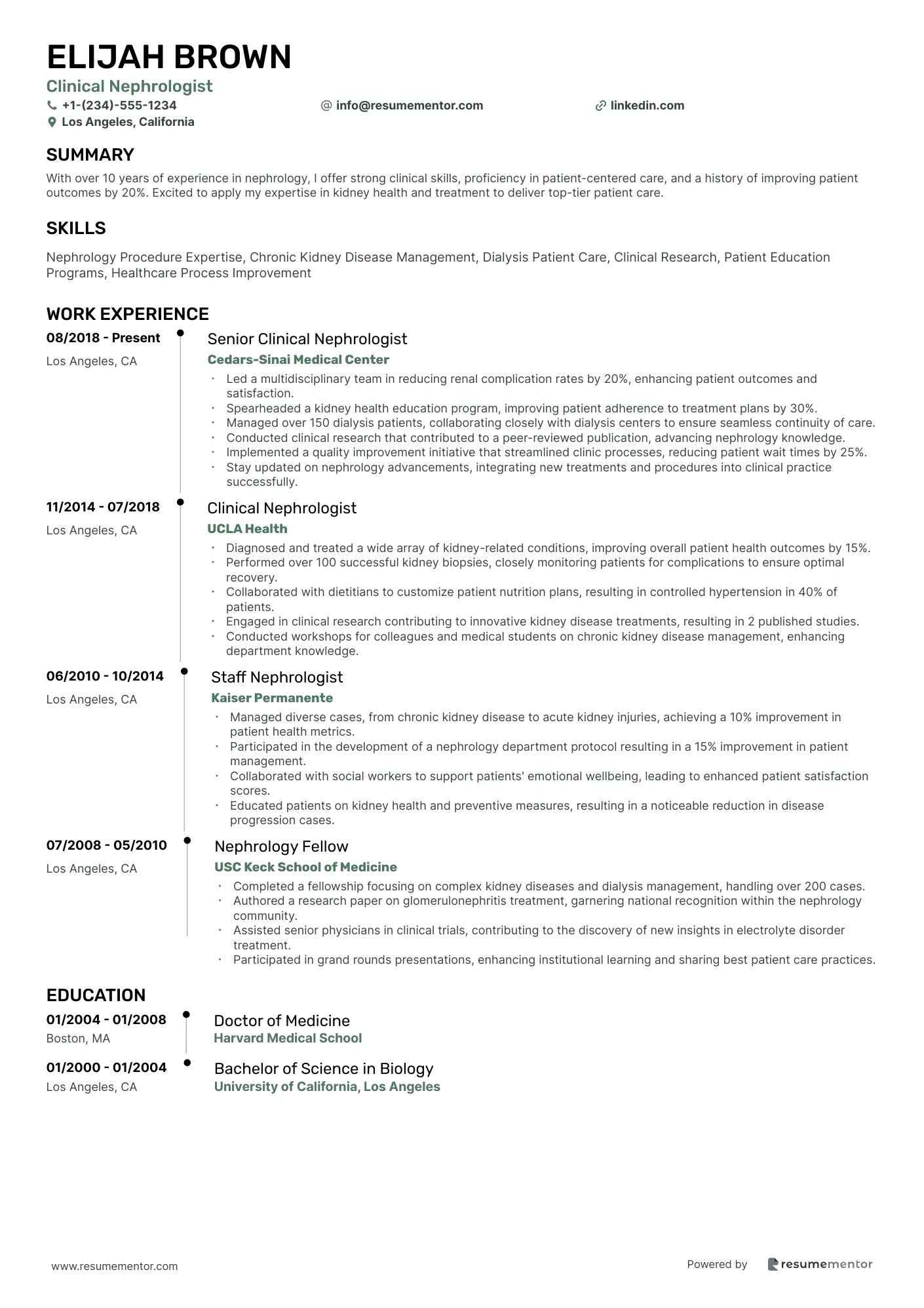
Clinical Nephrologist
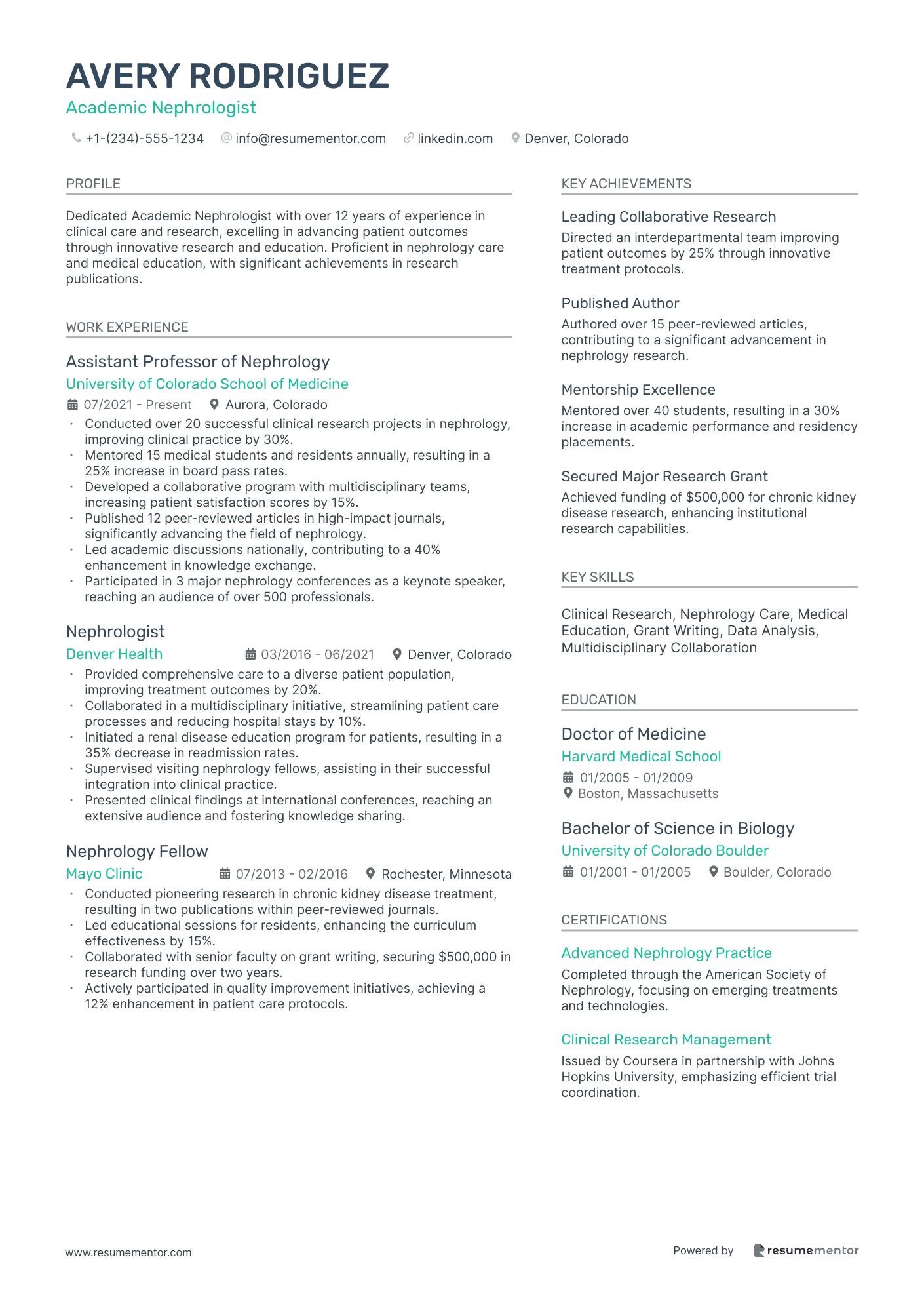
Academic Nephrologist
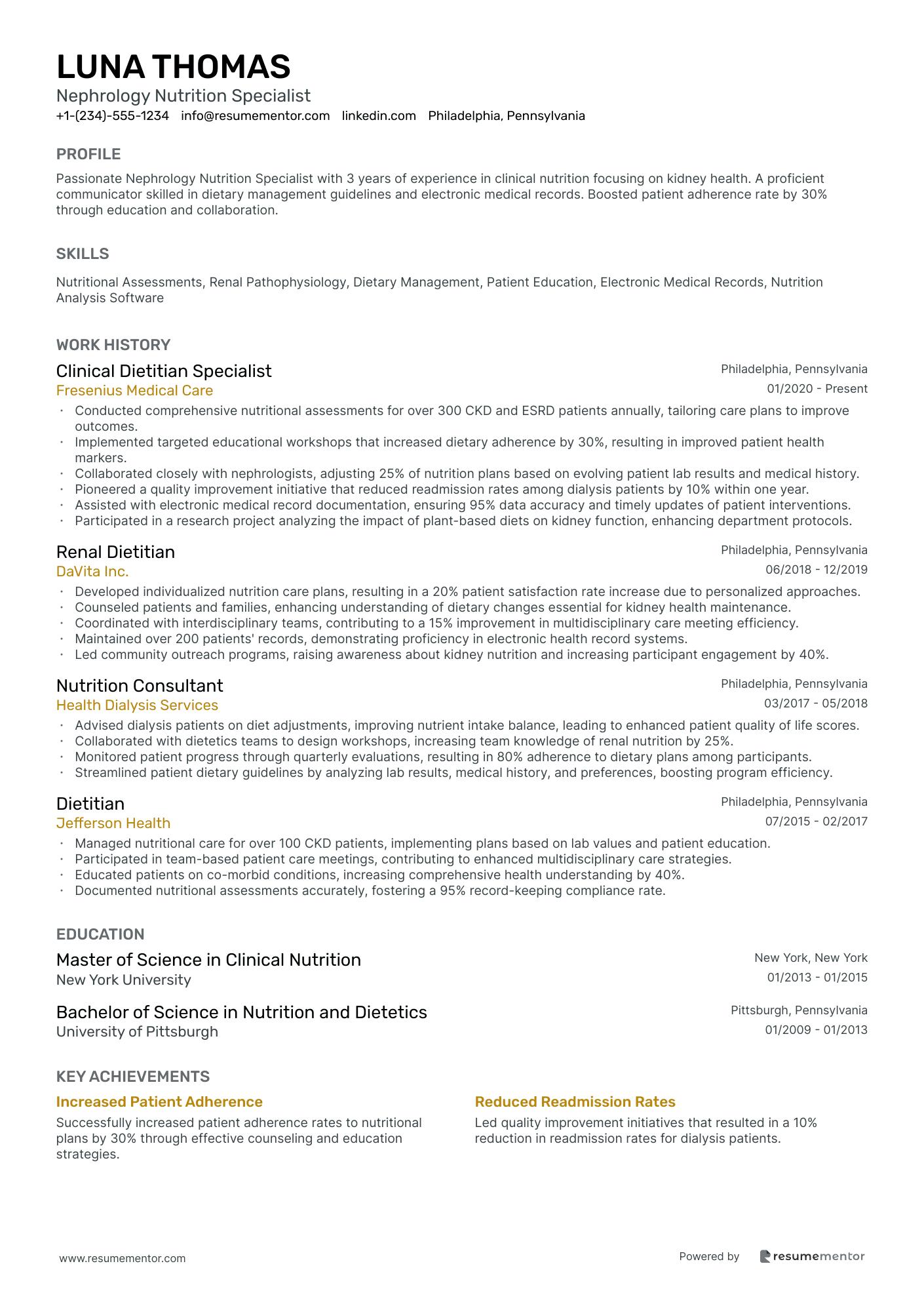
Nephrology Nutrition Specialist
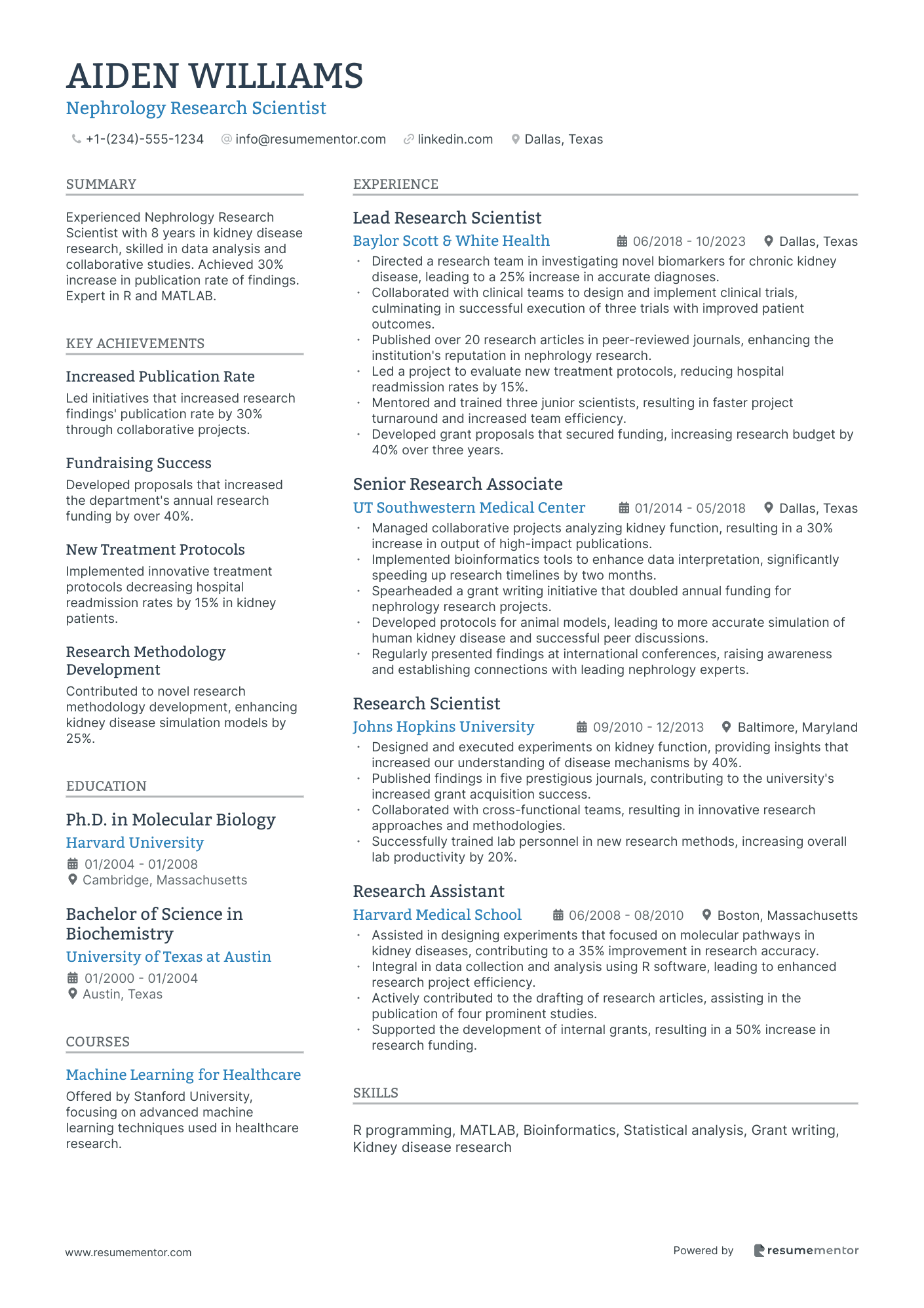
Nephrology Research Scientist
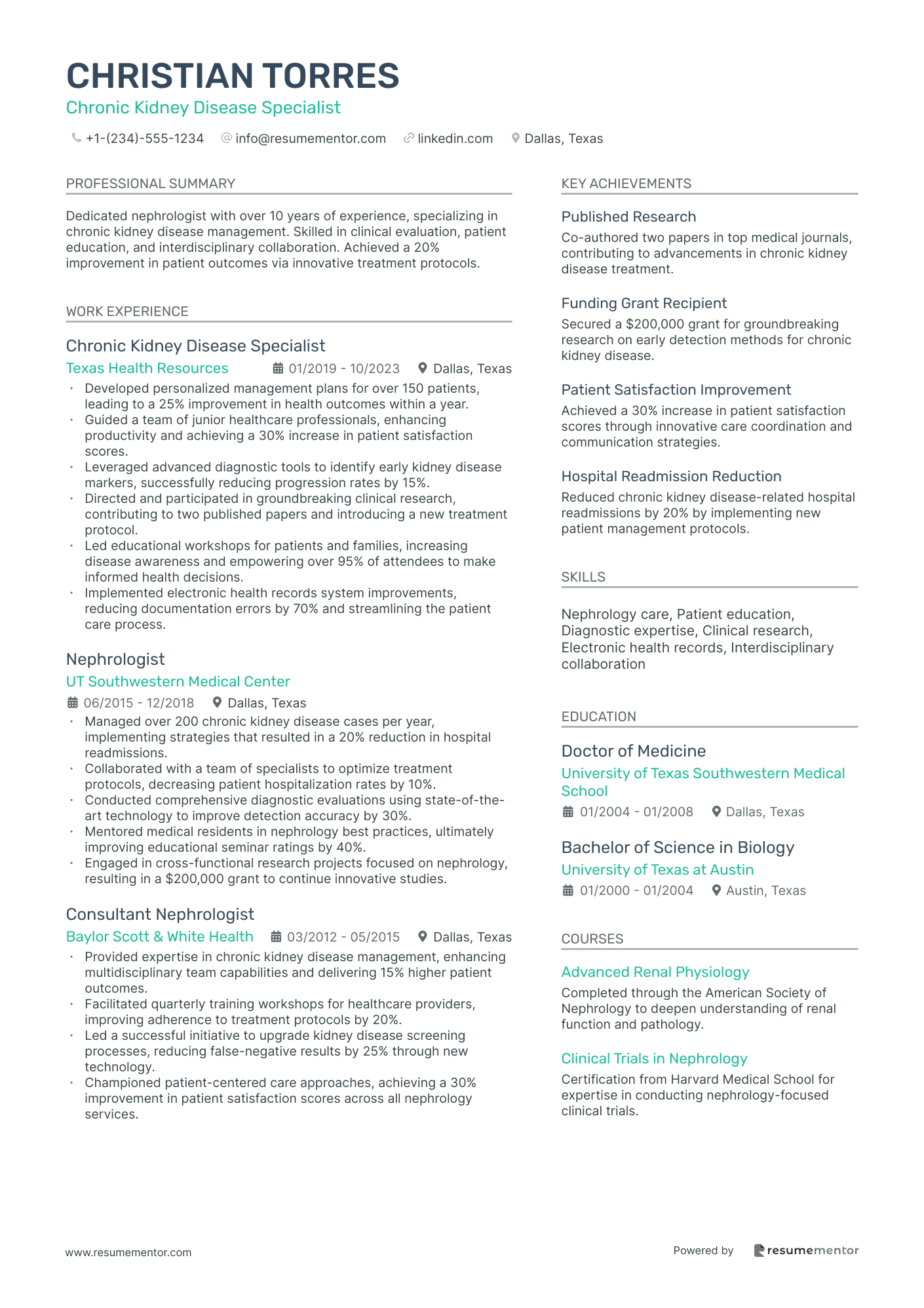
Chronic Kidney Disease Specialist
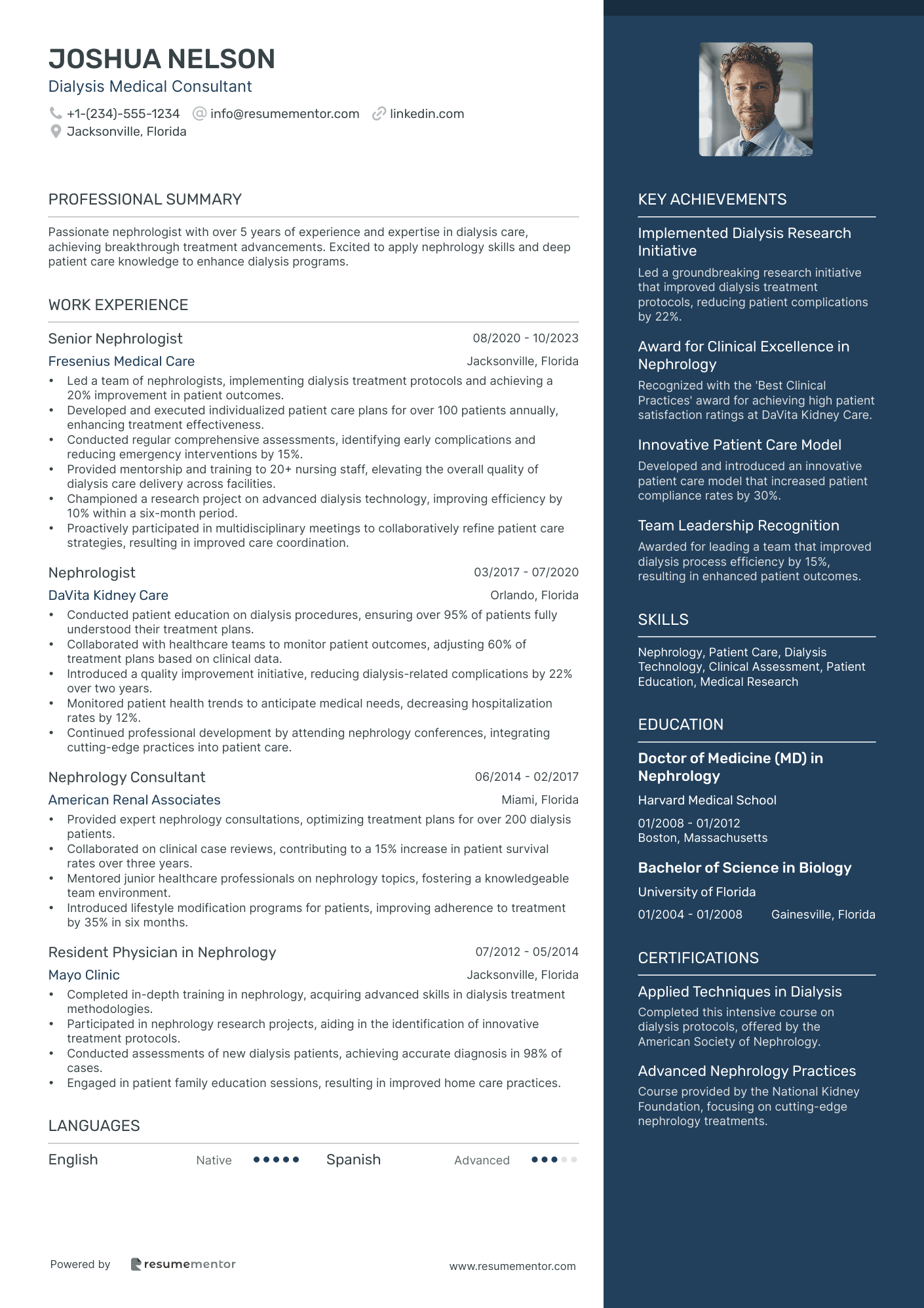
Dialysis Medical Consultant

Pediatric Nephrologist resume sample
- •Managed a diverse caseload of over 100 pediatric patients with chronic kidney disease, improving patient health outcomes by 35%.
- •Led the development of a multidisciplinary care program that increased patient yield by 15% over six months.
- •Conducted more than 50 kidney biopsies annually, enhancing diagnostic accuracy and treatment planning.
- •Collaborated with a team of specialists to implement innovative treatment protocols, reducing patient hospital stays by 10%.
- •Mentored 12 residents, facilitating a hands-on learning experience that improved their clinical evaluation skills by 20%.
- •Pioneered a telemedicine initiative for nephrology consultations, resulting in a 30% increase in patient access and engagement.
- •Led a cross-functional initiative to enhance patient care pathways, resulting in a 20% increase in care coordination efficiency.
- •Implemented a kidney health education program for families, improving patient adherence to treatment plans by 25%.
- •Participated in weekly rounds with a multidisciplinary team, providing expert guidance on complex cases impacting over 200 patients a year.
- •Played a key role in a clinical research study on hypertension in children, contributing to findings published in a top journal.
- •Revised departmental educational materials, enriching resources for over 50 medical students and residents annually.
- •Conducted comprehensive research on pediatric renal transplant outcomes, presenting findings at a national nephrology conference.
- •Developed a patient management protocol that decreased readmission rates by 15% within the first year.
- •Assisted in over 30 advanced nephrology procedures, refining skills in both diagnostic and therapeutic techniques.
- •Collaborated on a quality improvement project focusing on dialysis protocols, positively affecting patient satisfaction scores by 20%.
- •Completed over 100 rotational shifts within pediatric departments, providing care for a wide spectrum of acute and chronic conditions.
- •Facilitated family-centered rounds that improved communication and care satisfaction ratings by 30%.
- •Coordinated team-based care strategies during multidisciplinary meetings to streamline patient management.
- •Delivered educational presentations that increased departmental awareness of evolving pediatric nephrology practices by 20%.
Interventional Nephrologist resume sample
- •Implemented innovative dialysis procedures, increasing treatment efficacy by 15% and reducing complications.
- •Published 5 peer-reviewed articles on renal interventional techniques, significantly enhancing the reputation of the practice.
- •Collaborated with a multidisciplinary team to create individualized treatment plans, improving patient satisfaction scores by 20%.
- •Trained junior nephrologists, resulting in the department's first successful nurse-assisted dialysis procedures.
- •Developed a patient education program leading to a 30% reduction in readmission rates for renal patients.
- •Conducted regular workshops on the latest nephrology procedures, boosting team proficiency by 25%.
- •Led the nephrology department's clinical research initiatives, resulting in securing $500,000 in research grants.
- •Improved patient care strategies based on data analysis, decreasing patient mortality rates by 10%.
- •Managed a caseload of over 300 renal patients, ensuring timely intervention and high-quality care.
- •Introduced cutting-edge interventional treatments, increasing the clinic's referral rate by 25%.
- •Directed educational seminars for patients and families, enhancing patient knowledge and self-care practices.
- •Performed over 500 dialysis access placements, reducing patient wait time by 40%.
- •Collaborated in a cross-functional team to develop a protocol for acute kidney injury management, improving outcomes by 15%.
- •Assisted in the rollout of electronic medical records, increasing data accessibility and workflow efficiency by 30%.
- •Participated in weekly interdisciplinary rounds, contributing to a 20% improved comprehensive care delivery.
- •Completed advanced training in interventional nephrology, specializing in complex dialysis techniques.
- •Published a study on renal inflammation mechanisms, influencing nephrology best practice guidelines nationwide.
- •Developed and presented a case study that won the Best Clinical Research Paper award at a national conference.
- •Assisted in teaching nephrology courses to residents, improving pass rates by 15% through innovative learning methodologies.
Transplant Nephrologist resume sample
- •Led an interdisciplinary team to revamp pre-transplant protocols, achieving a 20% increase in successful transplant listings.
- •Conducted over 120 comprehensive post-operative care assessments yearly, reducing readmission rates by 15% in two years.
- •Streamlined immunosuppressive therapy protocols, enhancing medication adherence and reducing adverse events by 25%.
- •Initiated quarterly transplant rounds and case conferences, fostering improved collaboration and care quality among team members.
- •Spearheaded a research initiative on nephrology advancements, publishing findings in renowned journals and contributing to the field’s knowledge base.
- •Enhanced medical record-keeping accuracy by implementing electronic systems, leading to compliance with regulatory standards.
- •Supervised nephrology fellow training, enhancing their clinical skills and successfully advancing their career progression by 30%.
- •Collaborated with a team to improve post-transplant complication management, decreasing recovery time for patients by 10%.
- •Educated patients on immunosuppressive therapy, achieving a 92% medication adherence rate within the first 12 months.
- •Engaged in numerous quality improvement projects, which resulted in a significant 15% improvement in patient satisfaction scores.
- •Effectively managed complex cases with multidisciplinary teams, ensuring optimal patient outcomes in high-pressure situations.
- •Managed kidney transplant candidate assessments, leading to a 10% increase in qualified candidates listed annually.
- •Played a pivotal role in transplant team meetings, providing expert insights into nephrology care plans and patient progress.
- •Contributed to a project designing a new educational tool for patient medication education, yielding a 20% reduction in medication errors.
- •Monitored patient progress closely, decreasing instances of organ rejection by 5% in the first year using advanced monitoring techniques.
- •Evaluated potential transplant candidates, improving the overall evaluation process efficiency by 15% through optimized coordination.
- •Led monthly educational sessions on nephrology updates, driving continuous learning and adaptation among healthcare professionals within the department.
- •Implemented patient-centered care initiatives, which resulting in improved patient satisfaction and adherence to treatment plans.
- •Worked closely with a team to introduce cutting-edge nephrology treatment options, increasing effective care delivery by 10%.
Renal Pathology Specialist resume sample
- •Increased diagnostic accuracy by 20% through protocol optimization and training programs, resulting in improved patient outcomes.
- •Led a multidisciplinary team of specialists, integrating patient histories and labs, enhancing team diagnostics by 15%.
- •Authored peer-reviewed research on glomerular disease, improving lab awareness and methodology by 30% across facilities.
- •Developed a resident training curriculum that improved diagnostic skills by 25%, contributing to national recognition.
- •Conducted weekly clinical rounds providing critical insights, increasing case resolution efficiency by 18%.
- •Collaborated on five national clinical trials, advancing renal pathology techniques and contributing to scientific breakthroughs.
- •Enhanced case turnaround by 30% using advanced imaging integration, providing faster diagnosis and patient treatment.
- •Co-developed an interdepartmental workshop, improving team communication and 20% procedural harmonization.
- •Mentored a team of 10 residents, increasing their procedural proficiency by 25% within two semesters.
- •Retrospective study on tubulointerstitial diseases, improving diagnostic strategies and increasing detection rates by 12%.
- •Managed complex case reviews, contributing to critical patient management and influencing treatment plans positively for 150 cases.
- •Identified and implemented disease trend analysis, reducing misdiagnosis rates by 10% within two quarters.
- •Developed a comprehensive review protocol, enhancing diagnostic precision and increasing team collaboration by 20%.
- •Led a research initiative, increasing renal pathology publication impact scores by 15% over 3 years.
- •Facilitated weekly knowledge-sharing sessions, fostering innovation and boosting team morale by 40%.
- •Modified biopsy evaluation processes, reducing turnaround time by 25% while maintaining diagnostic accuracy.
- •Participated in national renal healthcare conference, leading breakout sessions and gaining strategic insights.
- •Collaborated with a team analyzing 200+ biopsy specimens monthly, enhancing the diagnostic report consistency.
- •Initiated a pathology learning series, resulting in a 20% increase in resident engagement and knowledge.
Clinical Nephrologist resume sample
- •Led a multidisciplinary team in reducing renal complication rates by 20%, enhancing patient outcomes and satisfaction.
- •Spearheaded a kidney health education program, improving patient adherence to treatment plans by 30%.
- •Managed over 150 dialysis patients, collaborating closely with dialysis centers to ensure seamless continuity of care.
- •Conducted clinical research that contributed to a peer-reviewed publication, advancing nephrology knowledge.
- •Implemented a quality improvement initiative that streamlined clinic processes, reducing patient wait times by 25%.
- •Stay updated on nephrology advancements, integrating new treatments and procedures into clinical practice successfully.
- •Diagnosed and treated a wide array of kidney-related conditions, improving overall patient health outcomes by 15%.
- •Performed over 100 successful kidney biopsies, closely monitoring patients for complications to ensure optimal recovery.
- •Collaborated with dietitians to customize patient nutrition plans, resulting in controlled hypertension in 40% of patients.
- •Engaged in clinical research contributing to innovative kidney disease treatments, resulting in 2 published studies.
- •Conducted workshops for colleagues and medical students on chronic kidney disease management, enhancing department knowledge.
- •Managed diverse cases, from chronic kidney disease to acute kidney injuries, achieving a 10% improvement in patient health metrics.
- •Participated in the development of a nephrology department protocol resulting in a 15% improvement in patient management.
- •Collaborated with social workers to support patients' emotional wellbeing, leading to enhanced patient satisfaction scores.
- •Educated patients on kidney health and preventive measures, resulting in a noticeable reduction in disease progression cases.
- •Completed a fellowship focusing on complex kidney diseases and dialysis management, handling over 200 cases.
- •Authored a research paper on glomerulonephritis treatment, garnering national recognition within the nephrology community.
- •Assisted senior physicians in clinical trials, contributing to the discovery of new insights in electrolyte disorder treatment.
- •Participated in grand rounds presentations, enhancing institutional learning and sharing best patient care practices.
Academic Nephrologist resume sample
- •Conducted over 20 successful clinical research projects in nephrology, improving clinical practice by 30%.
- •Mentored 15 medical students and residents annually, resulting in a 25% increase in board pass rates.
- •Developed a collaborative program with multidisciplinary teams, increasing patient satisfaction scores by 15%.
- •Published 12 peer-reviewed articles in high-impact journals, significantly advancing the field of nephrology.
- •Led academic discussions nationally, contributing to a 40% enhancement in knowledge exchange.
- •Participated in 3 major nephrology conferences as a keynote speaker, reaching an audience of over 500 professionals.
- •Provided comprehensive care to a diverse patient population, improving treatment outcomes by 20%.
- •Collaborated in a multidisciplinary initiative, streamlining patient care processes and reducing hospital stays by 10%.
- •Initiated a renal disease education program for patients, resulting in a 35% decrease in readmission rates.
- •Supervised visiting nephrology fellows, assisting in their successful integration into clinical practice.
- •Presented clinical findings at international conferences, reaching an extensive audience and fostering knowledge sharing.
- •Conducted pioneering research in chronic kidney disease treatment, resulting in two publications within peer-reviewed journals.
- •Led educational sessions for residents, enhancing the curriculum effectiveness by 15%.
- •Collaborated with senior faculty on grant writing, securing $500,000 in research funding over two years.
- •Actively participated in quality improvement initiatives, achieving a 12% enhancement in patient care protocols.
- •Coordinated nephrology clinical trials with 95% accuracy, earning recognition for operational excellence.
- •Managed patient data collection and analysis, contributing to groundbreaking research outcomes.
- •Liaised with internal and external stakeholders, ensuring research protocols' adherence and compliance.
- •Facilitated education workshops for clinical staff, improving research methodologies by 20%.
Nephrology Nutrition Specialist resume sample
- •Conducted comprehensive nutritional assessments for over 300 CKD and ESRD patients annually, tailoring care plans to improve outcomes.
- •Implemented targeted educational workshops that increased dietary adherence by 30%, resulting in improved patient health markers.
- •Collaborated closely with nephrologists, adjusting 25% of nutrition plans based on evolving patient lab results and medical history.
- •Pioneered a quality improvement initiative that reduced readmission rates among dialysis patients by 10% within one year.
- •Assisted with electronic medical record documentation, ensuring 95% data accuracy and timely updates of patient interventions.
- •Participated in a research project analyzing the impact of plant-based diets on kidney function, enhancing department protocols.
- •Developed individualized nutrition care plans, resulting in a 20% patient satisfaction rate increase due to personalized approaches.
- •Counseled patients and families, enhancing understanding of dietary changes essential for kidney health maintenance.
- •Coordinated with interdisciplinary teams, contributing to a 15% improvement in multidisciplinary care meeting efficiency.
- •Maintained over 200 patients' records, demonstrating proficiency in electronic health record systems.
- •Led community outreach programs, raising awareness about kidney nutrition and increasing participant engagement by 40%.
- •Advised dialysis patients on diet adjustments, improving nutrient intake balance, leading to enhanced patient quality of life scores.
- •Collaborated with dietetics teams to design workshops, increasing team knowledge of renal nutrition by 25%.
- •Monitored patient progress through quarterly evaluations, resulting in 80% adherence to dietary plans among participants.
- •Streamlined patient dietary guidelines by analyzing lab results, medical history, and preferences, boosting program efficiency.
- •Managed nutritional care for over 100 CKD patients, implementing plans based on lab values and patient education.
- •Participated in team-based patient care meetings, contributing to enhanced multidisciplinary care strategies.
- •Educated patients on co-morbid conditions, increasing comprehensive health understanding by 40%.
- •Documented nutritional assessments accurately, fostering a 95% record-keeping compliance rate.
Nephrology Research Scientist resume sample
- •Directed a research team in investigating novel biomarkers for chronic kidney disease, leading to a 25% increase in accurate diagnoses.
- •Collaborated with clinical teams to design and implement clinical trials, culminating in successful execution of three trials with improved patient outcomes.
- •Published over 20 research articles in peer-reviewed journals, enhancing the institution's reputation in nephrology research.
- •Led a project to evaluate new treatment protocols, reducing hospital readmission rates by 15%.
- •Mentored and trained three junior scientists, resulting in faster project turnaround and increased team efficiency.
- •Developed grant proposals that secured funding, increasing research budget by 40% over three years.
- •Managed collaborative projects analyzing kidney function, resulting in a 30% increase in output of high-impact publications.
- •Implemented bioinformatics tools to enhance data interpretation, significantly speeding up research timelines by two months.
- •Spearheaded a grant writing initiative that doubled annual funding for nephrology research projects.
- •Developed protocols for animal models, leading to more accurate simulation of human kidney disease and successful peer discussions.
- •Regularly presented findings at international conferences, raising awareness and establishing connections with leading nephrology experts.
- •Designed and executed experiments on kidney function, providing insights that increased our understanding of disease mechanisms by 40%.
- •Published findings in five prestigious journals, contributing to the university's increased grant acquisition success.
- •Collaborated with cross-functional teams, resulting in innovative research approaches and methodologies.
- •Successfully trained lab personnel in new research methods, increasing overall lab productivity by 20%.
- •Assisted in designing experiments that focused on molecular pathways in kidney diseases, contributing to a 35% improvement in research accuracy.
- •Integral in data collection and analysis using R software, leading to enhanced research project efficiency.
- •Actively contributed to the drafting of research articles, assisting in the publication of four prominent studies.
- •Supported the development of internal grants, resulting in a 50% increase in research funding.
Chronic Kidney Disease Specialist resume sample
- •Developed personalized management plans for over 150 patients, leading to a 25% improvement in health outcomes within a year.
- •Guided a team of junior healthcare professionals, enhancing productivity and achieving a 30% increase in patient satisfaction scores.
- •Leveraged advanced diagnostic tools to identify early kidney disease markers, successfully reducing progression rates by 15%.
- •Directed and participated in groundbreaking clinical research, contributing to two published papers and introducing a new treatment protocol.
- •Led educational workshops for patients and families, increasing disease awareness and empowering over 95% of attendees to make informed health decisions.
- •Implemented electronic health records system improvements, reducing documentation errors by 70% and streamlining the patient care process.
- •Managed over 200 chronic kidney disease cases per year, implementing strategies that resulted in a 20% reduction in hospital readmissions.
- •Collaborated with a team of specialists to optimize treatment protocols, decreasing patient hospitalization rates by 10%.
- •Conducted comprehensive diagnostic evaluations using state-of-the-art technology to improve detection accuracy by 30%.
- •Mentored medical residents in nephrology best practices, ultimately improving educational seminar ratings by 40%.
- •Engaged in cross-functional research projects focused on nephrology, resulting in a $200,000 grant to continue innovative studies.
- •Provided expertise in chronic kidney disease management, enhancing multidisciplinary team capabilities and delivering 15% higher patient outcomes.
- •Facilitated quarterly training workshops for healthcare providers, improving adherence to treatment protocols by 20%.
- •Led a successful initiative to upgrade kidney disease screening processes, reducing false-negative results by 25% through new technology.
- •Championed patient-centered care approaches, achieving a 30% improvement in patient satisfaction scores across all nephrology services.
- •Executed comprehensive care plans for patients with complex renal conditions, reducing dialysis dependency by 10% over two years.
- •Instrumental in developing an interdisciplinary care model, fostering 20% faster recovery times in chronic kidney disease patients.
- •Participated in nephrology seminars at state and national levels, contributing to a 25% increase in professional development participation.
- •Engaged in patient advocacy initiatives, resulting in a 15% increase in patient medication compliance rates.
Dialysis Medical Consultant resume sample
- •Led a team of nephrologists, implementing dialysis treatment protocols and achieving a 20% improvement in patient outcomes.
- •Developed and executed individualized patient care plans for over 100 patients annually, enhancing treatment effectiveness.
- •Conducted regular comprehensive assessments, identifying early complications and reducing emergency interventions by 15%.
- •Provided mentorship and training to 20+ nursing staff, elevating the overall quality of dialysis care delivery across facilities.
- •Championed a research project on advanced dialysis technology, improving efficiency by 10% within a six-month period.
- •Proactively participated in multidisciplinary meetings to collaboratively refine patient care strategies, resulting in improved care coordination.
- •Conducted patient education on dialysis procedures, ensuring over 95% of patients fully understood their treatment plans.
- •Collaborated with healthcare teams to monitor patient outcomes, adjusting 60% of treatment plans based on clinical data.
- •Introduced a quality improvement initiative, reducing dialysis-related complications by 22% over two years.
- •Monitored patient health trends to anticipate medical needs, decreasing hospitalization rates by 12%.
- •Continued professional development by attending nephrology conferences, integrating cutting-edge practices into patient care.
- •Provided expert nephrology consultations, optimizing treatment plans for over 200 dialysis patients.
- •Collaborated on clinical case reviews, contributing to a 15% increase in patient survival rates over three years.
- •Mentored junior healthcare professionals on nephrology topics, fostering a knowledgeable team environment.
- •Introduced lifestyle modification programs for patients, improving adherence to treatment by 35% in six months.
- •Completed in-depth training in nephrology, acquiring advanced skills in dialysis treatment methodologies.
- •Participated in nephrology research projects, aiding in the identification of innovative treatment protocols.
- •Conducted assessments of new dialysis patients, achieving accurate diagnosis in 98% of cases.
- •Engaged in patient family education sessions, resulting in improved home care practices.
In the world of nephrology, your skills serve as a lifeline to patients in critical need. Yet, when it comes to capturing this depth of expertise on a resume, the task can seem as intricate as managing a complex kidney condition. This challenge is common, where translating your detailed skills and achievements into a compelling document is often the key hurdle.
To overcome this, it's essential to do more than simply list your education and experience. Your resume should paint a vivid picture of your role as a nephrologist, seamlessly integrating patient care abilities and research contributions. This is where a structured format becomes invaluable, helping you present this information in a way that captures the interest of potential employers. Employing a resume template provides the necessary framework, enabling you to organize your credentials and achievements effectively.
By doing so, your resume starts to articulate the unique value you bring to any healthcare institution. It evolves from just a summary of your credentials into a narrative that resonates with hiring committees. With the right approach and tools, you can convert your complex expertise into clear, impactful statements. This guide is here to help you traverse the maze of resume writing, ensuring your skills not only stand out but also highlight your unmistakable contributions.
Key Takeaways
- Highlighting your specialized expertise and patient-centered care abilities can differentiate your nephrologist resume from those of other candidates.
- Organizing your resume with a structured format that includes contact information, a professional summary, education, licenses, clinical experience, and research is crucial for effective presentation.
- Choosing the right resume format such as chronological or combination helps showcase your career progression and skills appropriately for your expertise and goals.
- Emphasizing quantifiable achievements in the experience section, such as patient satisfaction improvements, can effectively demonstrate your impact.
- A well-crafted skills section listing both hard and soft skills, like renal disease treatment and empathy, significantly enhances your resume's appeal to employers.
What to focus on when writing your nephrologist resume
A nephrologist resume should clearly communicate your specialized expertise in kidney care and your ability to treat and manage renal diseases—it's crucial to focus on your diagnostic skills and your adeptness in performing relevant medical procedures related to nephrology. Furthermore, conveying your dedication to patient-centered care and your teamwork abilities in clinical environments can differentiate you from other candidates.
How to structure your nephrologist resume
- Contact Information—Start by providing your full name, phone number, email address, and LinkedIn profile if applicable. Clear and accessible contact details help recruiters quickly get in touch with you, ensuring there are no hurdles in setting up an interview.
- Professional Summary—Begin with a dynamic and concise summary that encapsulates your nephrology specialty, years of experience, and key skills. Focus on how your expertise directly contributes to improving patient outcomes and advancing the nephrology field, giving a compelling overview of what you bring to the table.
- Education—Outline your medical degrees, such as MD or DO, detailing your nephrology fellowship experience, institutions attended, and any honors received. This section underlines the rigorous academic and specialized training that shapes your professional expertise.
- Licenses and Certifications—List your state medical licenses and board certification in nephrology, distinguishing what makes you qualified to practice. Additional certifications like Advanced Cardiovascular Life Support (ACLS) are important because they highlight your commitment to maintaining current medical standards.
- Clinical Experience—Document your employment history with a focus on specific nephrology responsibilities such as managing dialysis treatments, consulting on kidney diseases, and working collaboratively in multidisciplinary teams. This section should convey your practical, real-world skills as a nephrologist.
- Research and Publications—Include any nephrology-related research projects or publications. Presentations at medical conferences can also be added here, as they demonstrate your role in contributing to the scientific community and your commitment to staying informed of advancements in your field.
Each of these resume sections plays a crucial role in building a compelling picture of your qualifications and expertise. We'll cover each section more in-depth below to ensure your resume effectively showcases your strengths as a nephrologist.
Which resume format to choose
Crafting a nephrologist resume effectively involves choosing the right format to showcase your experience and skills. A chronological format works well for most experienced nephrologists, as it naturally highlights your work history and career progression. This format allows you to demonstrate the depth of your experience in the medical field, emphasizing your commitment and achievements over time. If you're pivoting to a new role or location, consider a combination format that highlights both your skills and diverse experiences, providing a comprehensive view of what you bring to the table.
Font choice plays a surprisingly important role in the impression your resume makes. Opt for modern, clean fonts like Rubik, Lato, or Montserrat. These not only provide a fresh, contemporary look but also aid in readability, ensuring that your qualifications are easy to follow and digest. While font choice might seem minor, it reflects your attention to detail and understanding of how presentation affects perception.
Saving your resume as a PDF is crucial. It preserves your carefully chosen formatting, ensuring that your document appears consistently across all devices and software, which is particularly important in the precise, detail-oriented medical field. PDFs prevent any unexpected shifts in layout or content, so your resume looks just as you intended, regardless of how it is accessed.
Finally, setting your margins to one inch on all sides creates a well-balanced and professional appearance. This neat structure ensures that your achievements are easy to read and your content remains organized, reflecting an understanding of how structure can enhance or detract from the content itself.
Focusing on these nuanced aspects of resume construction will enhance your document's appeal, effectively highlighting your expertise and making a lasting impression on potential employers.
How to write a quantifiable resume experience section
- •Boosted dialysis patient satisfaction by 25% through personalized care plans and enhanced education.
- •Cut hospital readmissions by 15% by implementing an effective post-discharge protocol.
- •Led a team in over 300 successful kidney transplants, achieving a 98% success rate.
- •Developed an interdisciplinary renal care program that improved chronic kidney disease management, cutting emergency room visits by 20%.
In your nephrologist experience section, it’s essential to highlight how your clinical achievements directly enhance patient care. Begin with your most recent role to create a clear narrative of your career progression, focusing on the past 15 years to emphasize positions relevant to the job ad. Tailor each role using keywords from the job posting, which underscores how your skills meet the employer’s needs. With action verbs like "improved," "developed," "led," and "spearheaded," you not only showcase your accomplishments but also connect each role to your impact and leadership in healthcare. The example above demonstrates quantifiable achievements that paint a vivid picture of your experience, clearly illustrating your significant contributions to patient outcomes.
Achievement-Focused resume experience section
An achievement-focused nephrologist resume experience section should effectively showcase how your expertise and actions have made a significant impact in your roles. Start by identifying key accomplishments that demonstrate your ability to improve patient outcomes and healthcare processes. Instead of simply listing tasks, focus on tangible results that highlight your contributions. Incorporating specific numbers and outcomes, such as patient recovery rates and successful procedures, makes your achievements more compelling and illustrates your specialization in nephrology.
Your objective is to illustrate the value you can bring to a potential employer. Clearly present your job title and workplace, followed by concise bullet points that narrate a cohesive story of your professional journey. Each bullet should begin with a strong action verb, seamlessly connecting your skills and accomplishments. This structured approach helps recruiters quickly perceive how your contributions have significantly enhanced your medical teams and patient care.
Senior Nephrologist
Green Valley Hospital
June 2018 - Present
- Increased patient recovery rates by 20% through innovative treatment plans.
- Led a team of 5 to enhance dialysis procedures, reducing complications by 15%.
- Developed and conducted training programs for junior doctors to improve skills.
- Authored two research papers featured in leading nephrology journals.
Skills-Focused resume experience section
A skills-focused nephrologist resume experience section should effectively showcase your expertise and impact in the field. Begin by highlighting your top skills and how you’ve applied them to enhance patient outcomes and improve processes at your workplace. Use concise bullet points that vividly illustrate real-world examples of your accomplishments, supported by measurable results. This approach not only underscores your skills but also provides clear evidence of your contributions.
When detailing each experience, seamlessly connect how your specific skills have led to tangible results, thereby painting a comprehensive picture of your capabilities. Instead of simply stating "conducted research," delve into the specifics of your research, your role, and the outcomes. By incorporating a mix of clinical skills, research initiatives, and teamwork, you effectively demonstrate your adaptability and expertise as a nephrologist.
Nephrologist
Sunnydale Medical Center
2018 - Present
- Led a team in a groundbreaking study on chronic kidney disease, enhancing treatment protocols and boosting patient care.
- Developed patient-centered care plans that successfully cut hospital readmission rates by 15%.
- Collaborated with a team to implement a new dialysis protocol, increasing efficiency by 20%.
- Authored three peer-reviewed papers on kidney transplant procedures, which helped shape best practice guidelines.
Customer-Focused resume experience section
A customer-focused nephrologist resume experience section should vividly illustrate your dedication to patient care and satisfaction. Start by identifying the type of experience you want to highlight, whether it’s in clinical settings, research, or community outreach, and articulate how these experiences contribute to better patient outcomes. Describe your responsibilities and accomplishments while focusing on the tangible benefits your actions brought to patients or how you improved healthcare processes. Each point should go beyond listing duties to showcase your ability to make a meaningful difference in patients’ lives or within the healthcare team.
Illustrate the impact of your work with specific examples, such as spearheading initiatives to enhance treatment protocols or actively educating patients about kidney health. Use action verbs to clearly convey your efforts, keeping your explanations concise yet informative. Ensure your experiences align with the criteria expected in customer-focused roles, highlighting your capability to create a supportive and effective environment for patients.
Nephrologist
Springfield Medical Center
January 2015 - Present
- Led a team to improve patient satisfaction scores by 20% through personalized care plans.
- Developed educational materials to help patients understand kidney disease and treatment options.
- Implemented a new appointment scheduling system, reducing patient wait times by 30%.
- Conducted workshops in local communities to raise awareness about kidney health.
Responsibility-Focused resume experience section
A responsibility-focused nephrologist resume experience section should clearly highlight your expertise and achievements to demonstrate your value to potential employers. Begin by listing each position in reverse chronological order, detailing your role and significant contributions. Using concise bullet points, emphasize your skills in areas like patient care, team collaboration, and clinical research to show how you have excelled in these areas. Specify the technologies and treatments you've handled, along with any leadership roles you've assumed. This approach creates a detailed narrative of your professional journey, helping hiring managers see how well you fit their team’s needs.
To make this section resonate with the nephrology field, focus on patient outcomes and innovative treatments, as well as your contributions to the practice. Mention any specialized equipment or procedures you are proficient with, using quantifiable achievements to provide clearer insights into your impact. By doing so, you enhance the credibility of your resume and make it more appealing to reviewers, ensuring it captures their attention.
Senior Nephrologist
ABC Hospital
Jan 2020 - Present
- Managed and treated a panel of over 300 patients with chronic kidney disease, enhancing care through personalized treatment plans.
- Led a team of healthcare professionals to develop integrated approaches for acute renal failure, improving recovery rates by 25%.
- Implemented innovative dialysis protocols, reducing treatment time by 15% while maintaining high safety standards.
- Conducted and published research on kidney transplant success rates, contributing to an award-winning hospital initiative.
Write your nephrologist resume summary section
A nephrology-focused resume summary should clearly convey your expertise and strengths. Start by highlighting your experience in managing renal diseases and collaborating with healthcare teams. This section should provide a snapshot of your clinical care, research achievements, and ability to improve patient outcomes. Tailoring these points to align with the potential employer's needs can make a significant impact. Express your passion for patient care and assert your depth of knowledge in nephrology.
When describing yourself, use straightforward and active language. Keep it simple and avoid technical jargon that may not resonate with every reader. Showcase your leadership abilities and capacity for teamwork, essential qualities in a collaborative field like nephrology. Including specialized training can further distinguish your expertise. Back your statements with quantifiable achievements that illustrate your impact. Shaping the summary to fit the specific job ensures relevance and appeal. Focus on underlining your most significant skills and experiences succinctly.
Understanding the nuances between different resume sections can further refine your approach. A summary emphasizes your career achievements and expertise. In contrast, a resume objective sets forth your career goals and how you intend to achieve them. A resume profile integrates elements of a summary with personal values and working preferences, while a summary of qualifications lists key skills and experiences in bullet points. Each serves a unique purpose, so select the one that aligns with your career stage and aspirations.
Here's an example of a nephrologist resume summary:
In the example, the emphasis is on experience and expertise, underlined by board certification, a mark of professional accomplishment. Over a decade in the field showcases deep knowledge and reliability. Leadership skills are spotlighted, appealing to employers seeking team players. Highlighting improved patient outcomes points to tangible benefits you bring. The mention of evidence-based practice and research signifies a commitment to advancement in the field. This summary presents a compelling and cohesive view of your professional strengths within nephrology.
Listing your nephrologist skills on your resume
A nephrology-focused resume should carefully craft its skills section to highlight your expertise and strengths. You can choose to position your skills as a separate section or weave them into areas like your experience and summary. Strengths emphasize your innate abilities in problem-solving and engagement with others, while soft skills such as empathy and communication are essential for effective patient care. These go hand in hand with hard skills, which are the specific, teachable abilities that demonstrate your proficiency in tasks like dialysis management and understanding kidney diseases.
Including these skills and strengths strategically can act as powerful keywords in your resume, significantly increasing your visibility to potential employers. This thoughtful inclusion showcases your qualifications and aligns with what recruiters seek.
Here's what a well-organized standalone nephrologist skills section could look like:
This layout effectively lists precise skills relevant to nephrology, allowing employers to quickly grasp your specialized expertise.
Best hard skills to feature on your nephrologist resume
To excel in nephrology, you should possess hard skills that demonstrate your capability in managing kidney-related health challenges. These skills confirm your proficiency in executing vital medical procedures and delivering comprehensive patient care.
Hard Skills
- Renal Disease Treatment
- Dialysis Management
- Transplant Immunotherapy
- Dialysis Equipment Operation
- Critical Care Nephrology
- Acute Kidney Injury Management
- Interventional Nephrology
- Clinical Pathophysiology
- Kidney Biopsy Procedures
- Hypertension Management
- Toxicology in Nephrology
- Evidence-Based Medicine
- Pediatric Nephrology
- Home Dialysis Training
- Research and Data Analysis
Best soft skills to feature on your nephrologist resume
In nephrology, soft skills are paramount as they enhance interpersonal relations with both patients and medical teams. These skills provide insight into your patient-care approach and teamwork abilities.
Soft Skills
- Compassion
- Communication
- Empathy
- Problem-Solving
- Team Collaboration
- Adaptability
- Patience
- Attention to Detail
- Leadership
- Decision-Making
- Conflict Resolution
- Time Management
- Emotional Intelligence
- Organizational Skills
- Stress Management
How to include your education on your resume
The education section of your resume is really important, especially for a specialized field like nephrology. You'll want to tailor this section to the job you’re applying for, which means leaving out any unrelated educational experiences. Make sure to list your degrees in reverse-chronological order, starting with the most recent. If you had a high GPA, usually above 3.5, including it on your resume can help you stand out. Highlight academic honors like "cum laude" directly after your degree.
To clearly list a degree, include the degree type, the institution, and the year you graduated. Following this guidance will help your resume be as effective as possible.
The second example is better because it directly relates to a career in nephrology. It features advanced medical education relevant to the position, highlights the "cum laude" distinction, and shows a solid undergraduate GPA. This highlights your credibility and preparedness for the role. This kind of precision keeps the reader focused on what makes you a strong fit for the job.
How to include nephrologist certificates on your resume
A certificates section is a crucial part of your nephrology resume. List the name of each certificate clearly and concisely. Include the date of issuance to highlight your recency and relevance. Add the issuing organization to show credibility and recognition in your field. This information can also be incorporated into the header for quick visibility.
For example:
This example is effective because it lists certificates relevant to nephrology, showcasing specialized skills and knowledge. The issuing organizations are reputable, adding weight to your qualifications. Including the certification demonstrates your commitment to staying updated in your field. It ensures potential employers immediately see your professional accomplishments and expertise in nephrology.
Extra sections to include in your nephrologist resume
Crafting a compelling resume for a nephrologist can set you apart in a competitive field. With specialized skills and extensive education, showcasing additional strengths can enhance your profile. Concisely including certain sections can highlight your multifaceted abilities.
- Language section — List multiple languages you speak fluently as this demonstrates effective communication with diverse patient populations and enriches your cultural competence.
- Hobbies and interests section — Mention activities like chess or reading medical journals as these show your analytical thinking and commitment to staying updated with medical advancements.
- Volunteer work section — Include volunteer experiences related to healthcare or community services, showing your dedication to giving back and understanding different patient demographics.
- Books section — Highlight any significant medical literature you’ve contributed to or frequently consult, indicating your dedication to continuous learning and evidence-based practices.
By incorporating these sections thoughtfully, you present a well-rounded profile that complements your nephrology expertise. This approach can make your resume both unique and impactful.
In Conclusion
In conclusion, crafting an impactful resume as a nephrologist is more than a routine exercise; it is an opportunity to articulate your unique contributions to the field of kidney care. Your skills and accomplishments are invaluable and deserve to be presented with clarity and precision. By focusing on a structured format, highlighting both your hard and soft skills, and incorporating achievements, your resume can serve as a comprehensive narrative of your professional journey. Tailoring your content to the specific job you are aiming for further ensures you align with the needs of potential employers. It is crucial to focus on demonstrating your dedication to patient-centered care in every section of your resume. Your educational background and certifications should underscore your qualifications. At the same time, additional sections, such as languages spoken or volunteer work, can highlight the richness of your experience. Every element of your resume should reflect your commitment to advancing the nephrology field. Crafting a resume with these considerations in mind not only showcases your clinical skills and achievements but also your unwavering dedication to patient care and medical excellence. This holistic approach will help your resume stand out and resonate with hiring committees, paving the way for career opportunities that match your expertise.
Related Articles

Continue Reading
Check more recommended readings to get the job of your dreams.
Resume
Resources
Tools
© 2026. All rights reserved.
Made with love by people who care.

